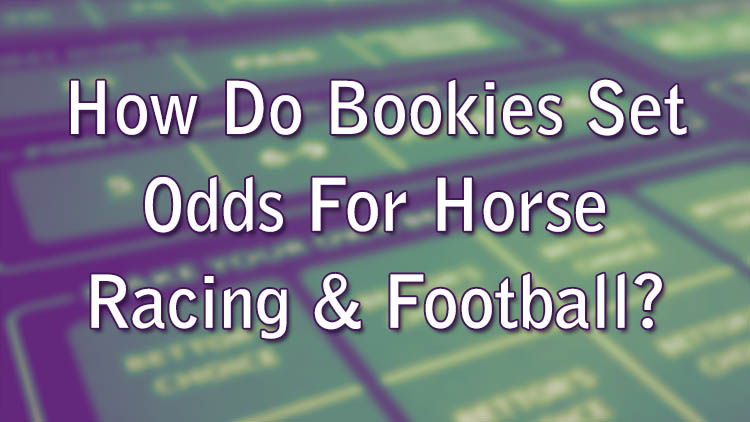
Betting odds play a pivotal role in the world of sports betting. They represent the probability of a certain outcome and determine any potential winnings. But how do bookies set odds for horse racing and football? Let's unravel the mystery in this Wizard Slots blog post.
How Do Bookies Set Odds?
In essence, bookies set the odds for sporting events based on a combination of statistical analysis and expert judgement. They employ odds compilers who analyse a wide range of variables, including a team's or horse's past performance, current form, injury status, and head-to-head records. These compilers then calculate the probability of each possible outcome and translate these probabilities into odds.
In the world of football betting, for instance, compilers consider factors such as a team's recent form, their performance against the specific opponent, squad health, and even the impact of weather and venue. For horse racing, a horse's previous race records, its fitness, the jockey's skills, and the race conditions are all taken into account.
After these initial odds are set, they can fluctuate based on market movements, meaning if a lot of punters are betting on a particular outcome, the bookmakers may reduce the odds on that outcome to try and limit any potential losses. This is often referred to as balancing the book, which aims to guarantee a profit for the bookmaker, regardless of the outcome.
How Accurate Are Bookies Odds?
Bookies' odds are typically a reliable indicator of the expected probability of a certain outcome. However, they are not always entirely accurate. This is because the odds also reflect the bookmaker's margin, a built-in advantage that ensures they can make a profit. The margin is often referred to as the overround, vig, or juice, and it's what makes betting odds slightly less than the true odds.
Thus, while bookies' odds can give you a good idea of the likely outcome of a sporting event, they are not foolproof. The odds are influenced by a range of factors, including the amount of money being wagered on each outcome and the bookmaker's desire to balance their book. This means that sometimes, the odds may not accurately reflect the true probability of the outcome.
Can Bookies Change Odds?
Yes, bookies can and do change odds.
Odds can fluctuate up until the event starts, and these changes are primarily due to two factors. Firstly, odds can change in response to significant news or developments. For example, if a key player is injured before a football match, the odds will be adjusted to reflect the increased likelihood of his team potentially losing.
The second reason for odds changing is market movement. If more money is being placed on a particular outcome, the bookmaker will reduce the odds to try and limit their potential losses. Similarly, if less money is being wagered on an outcome, the bookmaker may increase the odds, which may encourage more betting.
Do Bookies Ever Lose Money?
While bookmakers have strategies and systems in place to ensure they make a profit, there are instances where they can lose money. For example, if the favourite team or horse loses, bookmakers usually make a profit because most bets are placed on the favourite. However, if an underdog wins, especially in high-profile events with heavy betting, bookmakers may lose substantial sums of money.
Bookies Not Paying: Can They Refuse To Pay Out?
Bookies are legally obligated to pay out on any winning bets. However, there are circumstances where a bookie may refuse to pay out. This usually occurs when they believe there has been a breach of betting rules. For instance, if there is evidence of fraudulent activity or match-fixing, a bookmaker can withhold payment.
Additionally, bookmakers have terms and conditions that punters agree to when placing a bet. If a punter breaches these terms, the bookmaker may refuse to pay out.
It's always important to read and understand the terms and conditions before placing a bet.
How Often Do Bookies Get It Right?
Bookies are in the business of predicting outcomes, and they're quite good at it. The odds they offer are usually a fairly accurate prediction of the outcome. However, they're not infallible. Upsets and unexpected results are a regular part of sports, and these can throw even the most carefully calculated odds off track.
Can You Bet On Anything At The Bookies?
The range of bets you can place at a bookie is extensive. In addition to traditional bets on the outcome of a game or race, you can also bet on a wide variety of other aspects of the event. These can include the number of goals scored in a football match, the margin of victory in a horse race, and even more obscure facets like the number of corners in a football game or the number of falls in a horse race.
However, there are limits to what you can bet on. Each bookmaker will have its own list of markets that they offer odds on. Furthermore, there may be legal restrictions on certain types of bets, depending on the jurisdiction.
In conclusion, understanding how bookies set odds and how these odds can fluctuate can enhance your betting experience. It allows you to make more informed decisions and potentially increase your chances of winning.
However, it's always important to remember that betting should be done responsibly and for fun, rather than as a way to make money.
